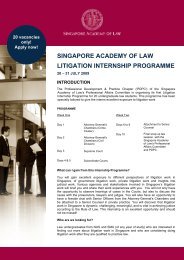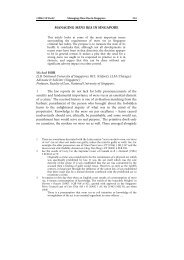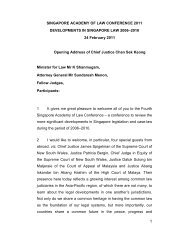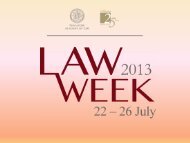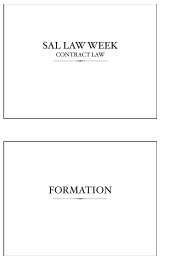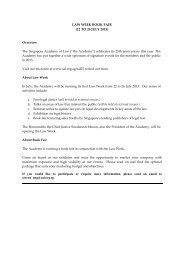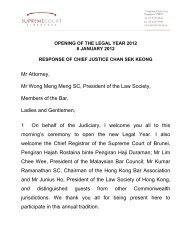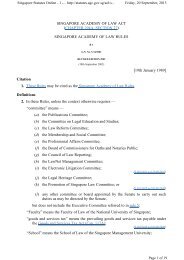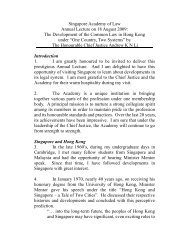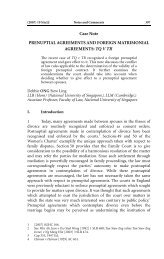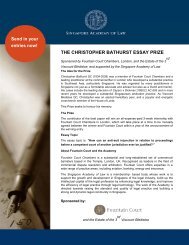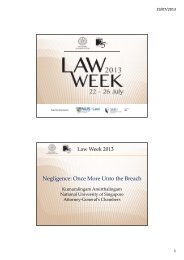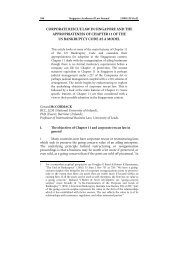View Article - Singapore Academy of Law
View Article - Singapore Academy of Law
View Article - Singapore Academy of Law
You also want an ePaper? Increase the reach of your titles
YUMPU automatically turns print PDFs into web optimized ePapers that Google loves.
15 SAcLJ Matrimonial Assets and the 3 rd Party 243<br />
charging order absolute were discharged, would still have his<br />
judgment debt. However, since the husband had no assets other<br />
than his share in the house, without a charging order, or some<br />
other method <strong>of</strong> reaching that share (e.g. bankruptcy), that<br />
judgment debt was likely to be worthless. Counsel for the<br />
judgment creditor was justified in saying that this point was<br />
merely restating the problem: on the figures in this case it was all<br />
or nothing.” (per Balcombe LJ at page 558 b-e)<br />
“The court is required, under the 1979 Act, to consider all the<br />
circumstances <strong>of</strong> the case. One <strong>of</strong> those circumstances is the<br />
position <strong>of</strong> the creditor; to prevent him recovering his debt<br />
against the only property <strong>of</strong> the debtor which is available may<br />
cause great hardship to him. The creditor has put in no evidence<br />
<strong>of</strong> hardship in the present case, but other cases may be very<br />
different.” (per Fox LJ at page 563 f-g) (emphasis added)<br />
54 On the facts, since the creditor had put in no evidence as to his<br />
circumstances, the Court <strong>of</strong> Appeal held that the judge had been entitled<br />
to decide that the hardship to the wife if the charging order was not<br />
varied (in the manner that it was by the registrar) was an overwhelming<br />
factor outweighing the creditor’s interests. 47<br />
55 In the light <strong>of</strong> the foregoing, it is submitted that the factors<br />
which should be included for consideration by the court when deciding<br />
whether to make the repayment order 48 are:<br />
I<br />
Purpose <strong>of</strong> the debt<br />
56 If the debt was taken for the benefit <strong>of</strong> the family, or if it was<br />
taken to acquire assets (even those considered as luxuries) or to generate<br />
income (business debts, for example) which, if the assets had some<br />
value, and pr<strong>of</strong>it had been made, would have been included in the pool <strong>of</strong><br />
matrimonial assets available for division, then that should be a factor in<br />
favour <strong>of</strong> making the repayment order.<br />
II<br />
Other party’s knowledge <strong>of</strong> and consent to the debt<br />
57 If the other party knew <strong>of</strong> and consented to the debt being taken<br />
out, that should be a factor in favour <strong>of</strong> making the repayment order.<br />
47<br />
48<br />
See para (2) <strong>of</strong> the holdings at p. 546.<br />
The list <strong>of</strong> factors is not meant to be exhaustive, but only to highlight the key factors<br />
to be taken into account.



